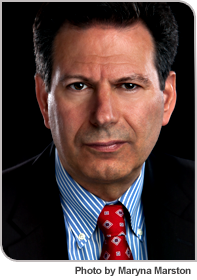 |
| Robert David Kaplan |
Said : Robert David Kaplan, an American journalist, in his book 'Mansoon' as reported by his colleague Antonia Colibasanu in her post of Nov. 11, 2013 titled "India: the Pivot of the 21st Century."
Antonia describes the recent meeting of the foreign ministers of Russia, China and India - on Nov. 10 on the sidelines of the Asia-Europe Meeting - as noteworthy especially since the three countries’ prime ministers have recently held bilateral meetings. She has linked this meeting between Sergei Lavrov, Salman Khurshid and Wang Yi in New Delhi with the growing importance of the Indian Ocean in the global politics of the 21st century. She feels that India has the strategic importance in the Indian Ocean geography and can be termed as "the natural pivot state of our century."
According to Antonia : "China’s interest in deepwater ports in friendly countries along the Indian Ocean coastline is notable and worthy of monitoring, as Beijing seeking to consolidate a presence it can use for civilian and military purposes. This aligns with the strategy China is pursuing in the South China Sea." She quotes Kaplan, who notes : “China, through the combination of its economic and military power, will undermine the sovereignty of countries such as Vietnam, Malaysia, the Philippines and Singapore, all of which are de facto or de jure U.S. allies.”
Kaplan, in his guest lecture at the Carnegie Council's Public Affairs Program on November 1, 2010, spoke on his book "Monsoon: The Indian Ocean and the Future of American Power." His remarks provide a good base of Antnia's observations in her blog. Kalpan, concluding his lecture, had said : "Vietnam looks like it will emerge like France or England in the 20th century, as a major ally of the United States in the South China Sea. The South China Sea will be somewhat of a diplomatic battleground. Vietnam, Malaysia, the Philippines, and other countries, all have claims over it. The world we are entering in is going to be one of a kind of Metternichian balance of power, where India, China, the United States, Vietnam, and other countries will leverage and cooperate with each other in some points, come into conflict in others. It will be a world where the center of strategic gravity will move from Europe to the southern rim land of Eurasia."
Robert D. Kaplan is Chief Geopolitical Analyst for Stratfor, a private global intelligence firm, and a non-resident senior fellow at the Center for a New American Security in Washington. He has been a foreign correspondent for The Atlantic for over a quarter century. He is the author of 14 books on foreign affairs and travel translated into many languages. Kaplan was chosen by Foreign Policy magazine as among the world’s “Top 100 Global Thinkers".




